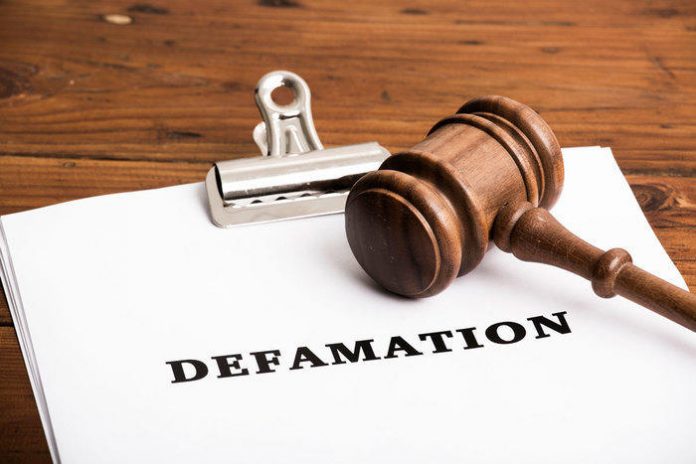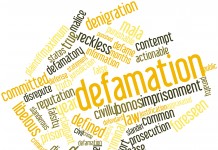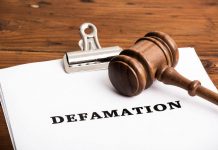This article is written by Sarthak Kulshrestha, a student of B.A. LLB. from Jagran Lakecity University, Bhopal. The article gives an overview of defamation and deals with the defamation suit filed by Dolce & Gabbana against the owners of Diet Prada.
Table of Contents
Introduction
A defamation suit has been brought by the Italian fashion corporate giant, Dolce & Gabbana (D&G) against two U.S fashion bloggers, Liu and Schuyler who have re-posted the alleged inconsiderate racist comments of one of the D&G designers. The lawsuit has been filed due to the publication of such comments through Instagram posts, videos, etc. by Diet Prada which a lot of people shared and the same spread hate against the D&G brand. This injured the reputation of the Italian brand as claimed by its owners.
The suit has been filed in an Italian Court under which Dolce & Gabbana has sought $600 million as damages from the defendants. This article will give clarity as to what defamation is, and explain the entire case in detail with the discussion about the contentions of both parties.
A brief on defamation
Defamation is a legal term that means the act of disrupting someone by attacking his/her well-established reputation in society. This is characterized by the publication of a false statement about a person and communication of the same to any third person to bring him/her to disrepute.
A suit of defamation is generally filed when a false statement is published by a person without the knowledge of the person about whom such a publication is made. A very important element of defamation is that mere causing hurt to another person’s feelings does not defame the person unless his reputation is injured. For example, Mr. A makes a derogatory remark about Mr. B in front of his colleagues, which hurts the feelings of Mr. B but his reputation is not at all damaged in the eyes of other people present there, so in such a case defamation suit cannot be filed against Mr. A as his remark did not injure the reputation of Mr. B which is a necessary requirement of defamation.
It is to be kept in mind that self-publication doesn’t count. For example, after a private conversation, the plaintiff tells everyone that he knows about the conversation with the defendant, in such a case, because the plaintiff self-published the false statement, the element of publication of a statement is not satisfied. The defendant must be the person who made the statement. However, there is an exception known as the repeater rule which says that if someone repeats a defamatory statement, the repeater is also liable for defamation.
Another example, suppose a stranger overhears the conversation accusing the plaintiff of murder. Following the eavesdropping, the stranger then sends an email, quoting what was said. In such a case the stranger is liable for defamation because he is a repeater.
There are two legal sub-categories of defamation or they can also be called the two forms of defamation, they are:
- Slander, and
- Libel.
Slander is characterized by the oral publication of a defamatory statement in the presence of a third person that ultimately injures the reputation of such a person. The speaker of such a statement is supposed to know or should have known that statement is false to classify it as slander. In a case of slander, the burden of proof lies on the plaintiff.
This means that the defendant does not have to prove the truth in the remarks he made, instead the plaintiff has to prove that the defamatory statements that were made against him by the defendant were false.
On the other hand, libel is a form of defamation that takes place by the communication of defamatory remarks against someone expressly in writing, pictures, signs, or in any other physical form which ultimately diminishes the reputation of the person and exposes him/her to public hatred.
In the present case, Dolce and Gabbana filed a suit of defamation characterized as libel against the owners of an Instagram page, Diet Prada, that caused a loss in revenue after it published a critical post about the brand. The counsel of Diet Prada had to contemplate much on the communication and style of the content of Diet Prada’s posts, just because of the complexities present in Italian law. Italian law includes the communication of the fact to the plurality of the people which injured the reputation of the plaintiff. Italian courts also consider social utility and restraints, which means that the information must be passed in a civilized manner that does not violate the minimum dignity of human beings.
Facts of the present case
In the year 2018, Dolce & Gabbana started one of its advertising campaigns for the runway show in China. The advertisement came into controversy on the grounds of cultural insensitivity which proved to be offensive for the Chinese folk. The controversial advertisement was featuring a Chinese woman in the attire of the Dolce & Gabbana brand who was shown trying to eat Italian cuisine viz. pizza, spaghetti, and cannoli with the help of chopsticks. A man was speaking in the Mandarin language in the background of the video but in a condescending tone. A lot of Chinese people found it very disrespectful and mindless. The Dolce & Gabbana brand presented the advertisement exhibiting the cultural differences between Italian and Chinese styles in a humour play, but it did not please the Asians, especially the Chinese people.
After a short period, some racist and anti-Asian remarks originated from the official Instagram page of the Dolce & Gabbana brand, which were purported to be made by Stefano Gabbana in a private chat. The designers claimed that their account was hacked. Later, both the designers, Domenico Dolce and Stefano Gabbana released a video in which they attempted to cart off the allegations and apologized for the insensitive comments about Asians. They also clarified that they respect the Chinese culture and did not have any intention to ridicule the Chinese culture or style through their advertisement as a medium.
As a result of the backlash, the show of Dolce & Gabbana was cancelled which was supposed to be organized in November 2018 in Shanghai. Not only was the show cancelled, but also the retailers revoked Dolce & Gabbana merchandise. Later, the Italian firm faced a boycott in Asia.
Right from the advertisement controversy to the boycott which the Italian brand faced in Asia, an influential Instagram fashion account, Diet Prada was vigilantly observing the backlash which the brand faced. And not so surprisingly, it was Diet Prada who broke the news about the contentious advertisement video. When Diet Prada released a set of direct messages via Instagram, it showcased Stefano Gabbana saying racist things. It did not paint Stefano Gabbana in a good light and the whole circumstance led to a huge loss of money for Dolce & Gabbana. A lot of esteemed celebrities cancelled their campaigns with Dolce & Gabbana. Stefano Gabbana defended the leak of such racist comments by saying that their Instagram account was hacked but due to the same, the reputation of Dolce & Gabbana was injured to a great extent. The people started riots in China, destroyed and looted the D&G showrooms across the country.
The posts of Diet Prada with the trending hashtag #boycottdolce on its page were seen by a lot of people and a kind of chain reaction of such posts started. People shared many posts, made videos on YouTube and other platforms, and shared it a lot. Following this, Dolce & Gabbana had to take down the video of the advertisement from all their social media pages.
Defamation suit
There was the cancellation of the runway show, many big celebrities from the brand also distanced from the brand, and also the reputation of Dolce & Gabbana was also damaged in such a big market of China. All of this allegedly happened due to the Instagram posts of the fashion watchdog, Diet Prada. Thus, the Italian brand opted to file a defamation suit against the Tribunale di Milano against Diet Prada operators, Tony Liu and Lindsey Schuyler.
In the defamation suit filed in 2019, D&G asks for over $600 million in damages from two U.S. fashion bloggers who reposted the comments. The owners of D&G have alleged that Diet Prada on its Instagram page, having more than 2.5 million followers, has uploaded posts consisting of serious and repeated defamatory content. This was aimed to damage the reputation of the Italian brand and the lawyer of Dolce & Gabbana maintains the legality of the damages in a broken-down form, as $450 million to reinstate the brand image that was intact before 2018, € 3 million as damages. At the same time, Dolce & Gabbana also claims that Mr. Gabbana was damaged in his capacity for €1 million as a result of Diet Prada’s allegedly defamatory attack on the brand. Apart from this, the brand also seeks $8.6 million for the cancellation of the show in Shanghai, another 8.6 million for personnel expenses, and 89.6 million for lost sales in Asia between November 2018 and March 2019 due to the spread of outrage against the brand among Asians.
The defamation lawsuit is seen as outrageous at different levels by the supporters of Diet Prada who are defending Liu and Schuyler. And through an Instagram post, Diet Prada broached the news about the lawsuit filed against them by D&G. They said that they seek the protection of Asians in the western world and are a stopper on anti-Asian or racist opinions, and for that very purpose they uploaded the posts which seemed objectionable to D&G. They emphasized their freedom of speech and expression in defense.
Previous instances of controversies related to D&G
In defense, Liu and Schuyler lodged a reply that foregrounded some past instances when Dolce & Gabbana had been involved in controversial advertisements or promotions. Diet Prada defended their action of criticizing the Italian brand with the help of such instances. In its 2007 gang-rape advertisement, D&G depicted women as helpless victims, and also shows violence linked with fashion.
Another instance is of an advertisement of D&G, in which a woman was depicted as victimized by the dominance of men over her, just to include violence in the fashion industry. Apart from these instances, Diet Prada also highlighted the tax evasion scam of D&G when the duo was sentenced to prison for 20 months as they have been avoiding 200 million Euros ($276 million) in taxes. They paid their taxes in Luxembourg and handed over 40 million Euros to the Italian taxman. The frankness of Diet Prada regarding the important issues and their influence on social media invites criticism for insensitive and unethical advertisement campaigns of various brands.
Jurisdiction of the lawsuit in question
The counsel for Liu and Schuyler argues upon the incapacity of D&G to sue the owners of Diet Prada individually. They claim that the posts which are being considered as objectionable by the plaintiff are not attributed to the owners of Diet Prada (defendants) in the case, but their corporate entity, THEDIETSODA LLC. The counsel for Liu and Schuyler said that the lawsuit is not valid since their corporate entity has not been named as the defendant.
The jurisdiction is also in question as per the counsel for defendants. It is contended that the plaintiff company is Dolce & Gabbana U.S.A. Inc., and the defendants, owner of Diet Prada, are also based in the U.S.A. So, Liu and Schuyler maintain that the case, if it has to be filed for alleged defamation, the same has to be done in the United States and not in Italy. They have asked the Court to ponder upon the lack of jurisdiction for an Italian Court and give the declaration of the jurisdiction in favour of a New York forum or, in favour of Shanghai forum.
Conclusion
The defamation suit against the owners of Diet Prada is in itself questionable because after the advertisement was derogated on a large level, D&G designers issued a public apology for the same. But still, they filed a defamation suit seeking a huge amount of damage of $600 million. This step of Dolce & Gabbana is seen as a way to silence Diet Prada. The problem in the lawsuit is that D&G did not sue not Diet Prada, the company but they sued the two individuals who own it, and that doesn’t seem justified. There is a considerable difference between the cases when a company is sued and when the individuals are sued. As in this case, if D&G just sued Diet Prada, the company, then if they lose, they would have to pay $600 million and since it does not have enough funds, the company would have gone bankrupt and that is the worst which one can imagine. But when the individuals are sued, as D&G has actually filed the suit against them, and the individuals lose, then the plaintiff can go for the recovery of their personal assets and recoup the funds. That is not at all justified and may prove to be troublesome for both individuals.
Therefore, if D&G proves that their Instagram account was hacked and they did not mean to give such comments, then Diet Prada owners would be left with no choice but to accept the orders of the Court. However, if the jurisdiction concerning the matter shifts and TheDietSoda, the corporate entity of Diet Prada is adjudicated as the defendant in the case, then Diet Prada could be saved from the excessive demands of the big fashion corporate, Dolce & Gabbana.
References
- https://www.britannica.com/topic/defamation#ref282782
- https://www.thefashionlaw.com/diet-pradas-founders-respond-to-dolce-gabbana-defamation-suit-over-alleged-smear-campaign/
- https://www.latestlaws.com/international-news/dolce-gabbana-files-defamation-suit-seeks-600-million-damages-from-us-bloggers/
Students of Lawsikho courses regularly produce writing assignments and work on practical exercises as a part of their coursework and develop themselves in real-life practical skills.
LawSikho has created a telegram group for exchanging legal knowledge, referrals, and various opportunities. You can click on this link and join:
https://t.me/joinchat/J_0YrBa4IBSHdpuTfQO_sA
Follow us on Instagram and subscribe to our YouTube channel for more amazing legal content.
 Serato DJ Crack 2025Serato DJ PRO Crack
Serato DJ Crack 2025Serato DJ PRO Crack











 Allow notifications
Allow notifications


